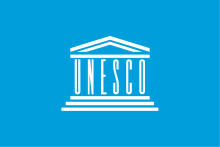
Back ИУНЕСКО Abkhazian Unesco Afrikaans UNESCO ALS ዩኔስኮ Amharic Unesco AN يونسكو Arabic ليونيسكو ARY يونيسكو ARZ ৰাষ্ট্ৰসংঘ শিক্ষা, বিজ্ঞান আৰু সংস্কৃতি সংস্থা Assamese UNESCO AST
 | |
| Abbreviation | UNESCO |
|---|---|
| Formation | 16 November 1945 |
| Type | United Nations specialized agency |
| Legal status | Active |
| Headquarters | Paris, France |
Director-General | Audrey Azoulay |
Deputy Director-General | Xing Qu |
Parent organization | United Nations Economic and Social Council |
| Staff | 2,341 (2022[1]) |
| Website | unesco.org |
The United Nations Educational, Scientific and Cultural Organization (UNESCO /juːˈnɛskoʊ/)[2][a] is a specialized agency of the United Nations (UN) with the aim of promoting world peace and security through international cooperation in education, arts, sciences and culture.[3][4] It has 194 member states and 12 associate members,[5] as well as partners in the non-governmental, intergovernmental and private sector.[6] Headquartered in Paris, France, UNESCO has 53 regional field offices[7] and 199 national commissions.[8][9]
UNESCO was founded in 1945 as the successor to the League of Nations' International Committee on Intellectual Cooperation.[10] UNESCO's founding mission, which was shaped by the events of World War II, is to advance peace, sustainable development and human rights by facilitating collaboration and dialogue among nations.[11] It pursues this objective through five major programme areas: education, natural sciences, social/human sciences, culture and communication/information. UNESCO sponsors projects that improve literacy, provide technical training and education, advance science, protect independent media and press freedom, preserve regional and cultural history, and promote cultural diversity.[12][13][14] The organization prominently helps establish and secure World Heritage Sites of cultural and natural importance.[15]
UNESCO is governed by the General Conference composed of member states and associate members, which meets biannually to set the agency's programs and budget. It also elects members of the executive board, which manages UNESCO's work, and appoints every four years a Director-General, who serves as UNESCO's chief administrator.
- ^ https://unsceb.org/hr-organization
- ^ "UNESCO". UNESCO. Archived from the original on 25 September 2013. Retrieved 25 September 2013.
- ^ "Introducing UNESCO". UNESCO. Archived from the original on 18 August 2011. Retrieved 8 August 2011.
- ^ "UNESCO history". UNESCO. Archived from the original on 9 April 2010. Retrieved 23 April 2011.
- ^ "List of UNESCO members and associates". UNESCO. Archived from the original on 15 August 2022. Retrieved 23 August 2022.
- ^ "Partnerships". UNESCO. 25 June 2013. Archived from the original on 23 August 2020. Retrieved 19 August 2020.
- ^ "Field offices". UNESCO. Archived from the original on 17 August 2020. Retrieved 19 August 2020.
- ^ "National Commissions". UNESCO. 28 September 2012. Archived from the original on 22 August 2020. Retrieved 19 August 2020.
- ^ "About UNESCO Office for the Pacific States". UNESCO. 1 August 2019. Retrieved 24 July 2023.
- ^ Grandjean, Martin (2018). Les réseaux de la coopération intellectuelle. La Société des Nations comme actrice des échanges scientifiques et culturels dans l'entre-deux-guerres [The Networks of Intellectual Cooperation. The League of Nations as an Actor of the Scientific and Cultural Exchanges in the Inter-War Period]. Lausanne: Université de Lausanne. Archived from the original on 12 September 2018. Retrieved 5 April 2019. (English summary Archived 22 March 2019 at the Wayback Machine).
- ^ "UNESCO. General Conference, 39th, 2017 [892]". UNESCO Digital Library. Archived from the original on 9 April 2020. Retrieved 19 August 2020.
- ^ "MOFA: Project list of The UNESCO Japanese Funds-in-Trust for the Capacity-building of Human Resources". mofa.go.jp. Retrieved 30 June 2022.
- ^ "Sponsors". climats-bourgogne.com. Retrieved 30 June 2022.
- ^ "Sponsors and Contributors". wcrp-climate.org. Retrieved 30 June 2022.
- ^ "UNESCO • General Conference; 34th; Medium-term Strategy, 2008–2013; 2007" (PDF). Archived (PDF) from the original on 28 July 2011. Retrieved 8 August 2011.
Cite error: There are <ref group=lower-alpha> tags or {{efn}} templates on this page, but the references will not show without a {{reflist|group=lower-alpha}} template or {{notelist}} template (see the help page).